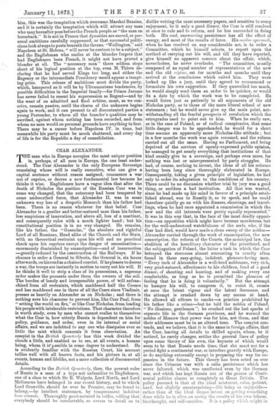TOPICS OF THE DAY.
THE IMPERIALIST PARTY.
THE Death of the Emperor Napoleon is, we believe, a cata- strophe for the Imperialists in France. At all events, it must greatly modify and weaken their position. It deprives them of an Emperor, of a leader who was known, who had been tried, who if recalled could at once resume the reins and put the machine in motion, who had defined and permanent relations with all manner of individuals, classes, interests, and States. Hitherto their theory has been that the Army, pro- voked by over-discipline, or misgovernment, or the prevalence of Radical ideas, would on some fine morning, probably the morning after M. Thiers' death, declare itself Imperialist, and take charge of the Provisional Government ; that the peasantry, weary of alarms and taxes and Protection, would acquiesce ;that the Emperor would be escorted in state back to Paris, and that the dynasty, re-established by acclaim, would thenceforward be secure. This is the theory which has made M. Rouher again a party leader, has emboldened the Imperialist Press, and has induced M. Thiers to say that no serious government could allow Prince Jerome freedom of locomotion in France. They regarded the Emperor's illness as hopeful rather than fatal to their cause, for they believed, as their boldest advo- cate, M. de Cassagnac, has avowed, that the operation would be successful, and that the Emperor, relieved of his disease, would regain the energy and the calmness of ten years ago. They thought he might reign for years, and regaining by some astute combination the territorial limits of France, might wipe out from men's recollection the catastrophes of 1870, cata- strophes which would be represented as due to the shattered condition of his frame. The fatal result of his illness changes everything for them, by removing from amongst them the only person who could carry out their projects, the pivot round whom all their ideas revolved. Some few of them, those who are devotees of the dynasty, as De Persigny was, who feel towards it as Legitimists feel towards the Comte de Chambord, will be unembarrassed, will transfer their allegiance unbroken to the Emperor's son, and will allege that he has an even better claim to it than the Founder's nephew, inas- much as he cannot be held even by the enemies of the House to have forfeited his rights by any failure of his own. He did not declare war, or leave his army disorganised, or capitu- late at Sedan, or in any other way forfeit his personal right to the devotion of his people. He is the heir of Napoleon I„ and he is innocent as Napoleon II. We do not doubt that Bonapartists of this type will plead strongly for the young Prince, or that they will spread the most flat- tering accounts of his qualities, or that they will have a con- siderable measure of sentimental success. The death of Napoleon must in the nature of things do much to clear his dynasty, with those who accept it, from all the difficulties which have interrupted or paralysed their loyalty. But the main body of the Imperialist party—the Generals and officers, and Prefects, and adventurers, and peasants—who are attached to it from a liking for personal government, or from a desire for order before all things, or from self- interesf, will be seriously perplexed, and it may be divided, by the difficulty of finding a successor. All is uncertainty, to begin with, as to their personal relations with the dynasty. No one can tell whom Napoleon IV. will favour, or dislike, or follow, nor can anyone be certain that he will accept his father's ideas. Then his dignity comes too soon. If the party accept Napoleon IV., they mast postpone their plans for years, for a Napoleon is nothing unless a Omar, and a lad of sixteen could not take up without preparation the Caasar's role, even if he possessed the unusual qualities sometimes ascribed to princes, qualities of which, in his case, there is as yet no proof. He may be his great-uncle over again, for aught that Europe knows ; but he is only recognised as yet even by his own party as a promising lad, who has imbibed early the sentiment of his rank, but has been over-instructed, disciplined, and experienced. Saarbruck was a misfortune for him. The Imperialists must have some one, either as inter- mediate Emperor or as Regent, who can be trusted at once, who can give the party its tone, and their choice is singu- larly limited. Of all the Napoleonidm, so numerous when reckoned as we English reckon relationships, but one is at once of full age, competent from experience, and within the family law of succession, and that one, Prince Jerome, is discredited in France. No one doubts his ability, which is remarkable—though of the demagogic rather than of the ruling
kind—or his ambition, or his devotion to the late Emperor ; but it is said the Army would not obey him, disbelieving his soldierliness, it is certain that the priests would resist him, and it is probable that he would be rejected even by his immediate party, the Jacobin Bonapartists. His chance of becoming Emperor is but slight, and of the Regency he has no chance at all, as his cousin's family would resist to the uttermost any such nomination. Regents who have sons are every where distrusted. There is no other Napoleon within the pale of the succession, except the Prince Imperial, and but one in it or out of it of the slightest real die-- tinction. The Cardinal, Lucien's grandson, is said to be the ablest Bonaparte alive, a man who might reinvigorate the Papacy ; but even if his Orders could be cancelled, as• was done in the case of the last Stuart, the Cardinal of York, his opinions would be a final barrier to his appointment. He is an ecclesiastic heart and soul, and would use France for the re-establishment of the Temporal Power. There remains the Empress, and it would appear almost certain that the Empress must be accepted by the party as Regent for the next fey years. Legally she is so in their view already ; she can be trusted to defend her son ; and she will have the support of every Bonapartist priest within the Empire. Her conduct in regard to the Metz intrigue did much to reconcile doubtful members of her husband's party—she really displayed both: patriotism and nerve in a high degree—and her reign need not be long, certainly not more than four years.
We look upon it as certain that the Imperialists will accept Napoleon IV., with the Empress as Regent for a time, and that this arrangement will considerably modify for the worse the position of the party. They lose the support of the brain, of the mystical prestige and of the policy of the Emperor. Whatever the judgment which history may pass upon Napo- leon's capacity, he certainly knew how to interest France, and it is by no means certain that his successor will. Then it is true, though it may not be admitted, that he was immensely aided by a notion that he was a "child of Destiny ;" that the- stars in their courses would fight for him, that he would return- to his throne because his return seemed so impossible. Then his successor's policy will range the party too closely up to the- line of the Legitimists. The special hold of Napoleon over political France was that he was a modern Sovereign, a Caesar not a King, a monarch born of the Revolution, who never forgot his ancestry. He always declared it his mission to moderate, not to combat, the Revolution ; he set Italy free ; he sanctioned the destruction of the Temporal Power ; and he never gave way voluntarily to the pretensions of the priest- hood. His was essentially a secular regime, and even his foreign policy, with its dreamy ideas of nationalities, and of the resurrection of the Latin race, and of the entente cordiale with England, was entirely modern and, so to speak, Napo- leonic. He supported universal suffrage as the only legitimate method of election, and in the last year- of his reign he displayed remarkable fortitude with respect to the liberty of the Press. His own theory of his own attitude was that he was preparing the way for liberty, and would at some future period crown the edifice. These are not by any means the ideas ascribed to the Empress. She- may be, possibly is, much abler than anyone believes—her letter from Egypt reasoning against a coup d'e'tat gives a hint of this—but she is Ultramontane, devoted to Rome, and to the interests of which Rome is the defender. The distinctive note of her policy would be nearly the distinctive note of the policy of the Legitimists, and thus while alienating all friends of her dynasty who are also Liberals, . would force all those who accept it because any Monarchy is preferable to any Republic to reflect whether, after all, the historical monarchy might not suit them best. Monarchy for monarchy, the oldest is the one usually preferred. It would be impos- sible for the Empress, with her opinions, to play the role of Caesar, either abroad or at home ; for abroad there is Rome and at home the confessor, and every depar,hzve from Camarism in a Bonaparte is a gain either to the Legitimists or the Con- stitutionalists, to the Comte de Chambord or to the Comte de Paris. If the Regency is to be the old monarchy in tone, why should power be refused to Henri Cinq ? if it is constitutional, where is the reason for rejecting Louis Philippe II.
And finally, we imagine that the Emperor's death, the immaturity of his son, and the reluctance of Frenchmen to entrust supreme power to a woman, will release many ambi- tions, set many who might have been Napoleon's followers free to strive for their own hand. Unless the world belies him, this was the temptation which overcame Marshal Bazaine and it is certainly the temptation which will attract any man who may hereafter pose before the French people as "the man on horseback." It is not in France that dynasties are sacred, or per sonal ambitions carefully suppressed, or that successful politi- cians look al ways to posts beneath the throne. "Wellington," said Napoleon at St. Helena, " will never be content to be a subject," and the Englishman who smiles at the blunder forgets that had Englishmen been French, it might not have proved a blunder at all. The "necessary man" there seldom stops short of his logical position at the top, even M. Thiers de- claring that he had served Kings too long, and either the Regency or the intermediate Presidency would appear a tempt- ing prize. This release of ambitions must divide the party, which, hampered as it will be by Ultramontane tendencies, by possible difficulties in the Imperial family—for Prince Jerome has never failed to resent his supersession as Regent—and by the want of an admitted and final arbiter, must, as we con- ceive, remain passive, until the charm of the unknown begins again to work, and it can present to all discontented parties a young Pretender, to whom all the founder's qualities may be ascribed, against whom nothing has been recorded, and from whom no man would on personal grounds have anything to fear. There may be a career before Napoleon IV. in time, but meanwhile his party must be much shattered, and every day of life is for the Republic a day of consolidation.



































 Previous page
Previous page